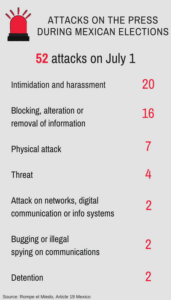Mexico held historic elections on July 1 with a landslide victory from Andrés Manuel López Obrador. And in an electoral season of unprecedented violence against politicians and political candidates, the press was also a target.
Journalists were arbitrarily detained, had work equipment stolen, were blocked from covering polling locations, received death threats, were targeted by social media campaigns to discredit them, and were threatened, grabbed and beaten.
 Throughout election day, various organizations used Twitter to spread news of aggressions against journalists, as well as guidelines for press workers to follow while in the field. They included the Rompe El Miedo network from Article 19 Mexico, Data Cívica, R3D and SocialTic; Periodistas Desplazados México; Propuesta Cívica; Periodismo Nación MX; Reporters Without Borders (RSF, for its initials in French); and the Committee to Protect Journalists (CPJ).
Throughout election day, various organizations used Twitter to spread news of aggressions against journalists, as well as guidelines for press workers to follow while in the field. They included the Rompe El Miedo network from Article 19 Mexico, Data Cívica, R3D and SocialTic; Periodistas Desplazados México; Propuesta Cívica; Periodismo Nación MX; Reporters Without Borders (RSF, for its initials in French); and the Committee to Protect Journalists (CPJ).
In the state of Chihuahua, three people beat radio announcer Fernando Lara while he was covering elections at a polling place, El Sol de Parral reported. The newspaper noted he is also an alternate councillor for the PRI.
An armed group illegally held a reporter for Línea Directa in Sinaloa for two hours, Rompe El Miedo reported. In Campeche, 15 people accompanying a public official surrounded two journalists as they were getting in their car and leaving a polling place where they had been working, according to the network. One of the journalists was allegedly told their camera would be taken if they kept taking photos.
Some attacks took place in the realm of the internet.
For example, an image showing a fake news story under the masthead of newspaper El Siglo de Torreón circulated on social media. The newspaper published on its site that the image was not real and debunked the story about the local politician.
A Facebook page tried to take advantage of a journalist’s name to publish false news about elections in Veracruz, according to Rompe El Miedo. Journalist Alfredo Santiago publishes via the Facebook page “Alfredo Santiago Noticias,” but the page spreading fake news was called “Alfredo Santiago Noticias AD.”
According to Rompe El Miedo, there were 143 attacks on the press from April 4 –when the network was activated– to July 1. On July 1 alone, the network recorded 52 attacks. The highest number of those cases were categorized as intimidation and harassment, with 20 recorded instances. Second was blocking, alteration or removal of information (16). Physical attacks came in third with 7 instances. A majority of the cases (24) were allegedly at the hands of public officials, according to Rompe El Miedo.
Ahead of elections, RSF listed a series of recommendations on issues of freedom of expression and protection of journalists for the next Mexican president, many of them coinciding with those expressed in the report on Mexico prepared by the Special Rapporteurs of the UN and the IACHR.
They include strengthening the Federal Mechanism for the Protection of Journalists with greater resources and adequate mechanisms to deal with the most urgent cases, paying attention to online attacks suffered by journalists and assessing the situation of journalists suffering forced displacement, RSF said.
RSF, CPJ and Article 19 Mexico expressed concerns about the treatment of journalists in Mexico and gave a list of recommendations to López Obrador’s campaign staff on May 28, according to RSF, but the organization noted that the recommendations were not mentioned during campaigning.
“We deplore the lack of political will on the part the presidential candidates who, despite declaring their good intentions, have given no concrete undertaking to effectively combat the spiral of violence and impunity for crimes against journalists,” said Emmanuel Colombié, the head of RSF’s Latin America bureau, according to an organization release. “The candidates are nonetheless aware of the urgency of implementing a full and effective policy for protecting journalists and preventing the risks to which they are exposed, as we recommend. Mexico’s next president will have this heavy responsibility and will need to make this policy a major element of the administration’s program if the deadly trend is to be reversed.”